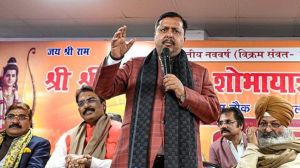The King and We
The continuing Chinese arms supply to Kathmandu is more than a tactical threat to India8217;s attempt at promoting democracy and stability ...

The continuing Chinese arms supply to Kathmandu is more than a tactical threat to India8217;s attempt at promoting democracy and stability in Nepal. It is about a real and present danger that threatens Delhi8217;s primacy in the subcontinent. The time is running out for the UPA government to get its Nepal act together and compel King Gyanendra to pay the costs of the China card he has chosen to play against India. Much like his father, Mahendra, who cozied up to Beijing in the early 1960s amidst rising Sino-Indian tensions, the present monarch thinks he can hustle India into legitimising his power grab. Unable to engineer a split in the coalition between India and the Anglo- American powers, King Gyanendra has put all his eggs in the China basket. This was evident at the regional summit earlier this month in Dhaka, when Nepal became the most vocal supporter of immediate Chinese affiliation with SAARC.
Under the cover of the rhetoric on 8220;non-interference in the internal affairs of neighbours8221;, China has exploited every recent opportunity to undermine India8217;s influence in the region. Given the host of problems between India and its neighbours, Beijing has been having a great political run in the subcontinent in recent years. It has become a political free rider, focused entirely on expanding its profile without any commitment to peace and stability in the subcontinent. If India does not quickly trump King Gyanendra8217;s China card, its standing in the region would rapidly diminish. Until now, both Washington and London have deferred to Indian leadership on Nepal; but if Indian policy remains paralysed by the fear of offending either King Gyanendra or Beijing, the other powers might want to go their own way.
Having recently stepped up the pressure on King Gyanendra, by bringing the Maoists and the political parties in Nepal together, the government must now find ways to squeeze him further. While China has made big advances in Nepal in recent years, the kingdom8217;s economic geography is inextricably intertwined with that of India. Virtually Nepal8217;s entire trade transits through India. So do its hydrocarbon supplies. Delhi is not short of options in getting King Gyanendra to meet the Indian demand for an early end to his unconstitutional personal rule over Nepal. What Delhi needs is a credible strategy of coercive diplomacy, aimed at reviving the political process in Nepal; and the gumption to carry it through.
- 01
- 02
- 03
- 04
- 05































